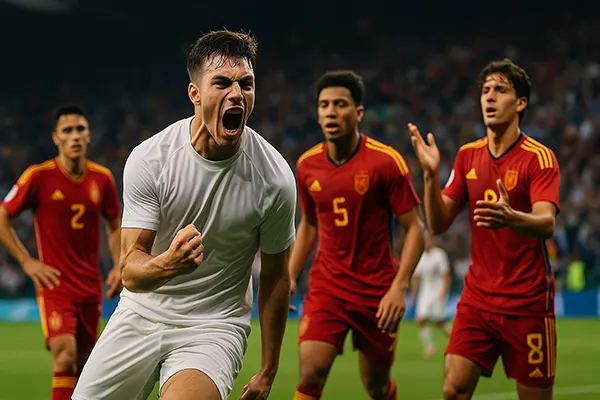The UEFA European Under-21 Championship 2025 is set to become one of the most anticipated tournaments in recent years. With elite youth teams from across the continent competing for glory, this competition serves as a launchpad for the next generation of football superstars. Many of today’s legends, including Kevin De Bruyne, Gianluigi Donnarumma, and Bruno Fernandes, first made their mark on this stage before rising to global prominence.
Overview of the 2025 Tournament
The 2025 UEFA U-21 Championship will be hosted by Slovakia, marking the first time the nation has organised the event. Matches will take place in cities such as Bratislava, Trnava, Nitra, and Košice, offering world-class facilities for both players and fans. The tournament will run from 11 June to 3 July 2025, bringing together 16 national teams.
The competition’s structure features a group stage followed by knockout rounds, with the top two teams from each group advancing to the quarter-finals. This format ensures high-intensity matches from the start, pushing teams to perform at their best. Each match will be closely monitored by UEFA to maintain the highest standards of fair play and integrity.
Besides the sporting prestige, the event holds major significance for young players aiming to showcase their skills in front of scouts from elite European clubs. The tournament is often a gateway to signing professional contracts with top-tier teams, making it a crucial stepping stone in their careers.
Key Teams and Contenders
Several national teams are expected to stand out in this year’s competition. Spain, Germany, and France have consistently produced world-class talents, and their U-21 squads remain favourites. Spain’s technically gifted side, known for their possession-based play, will aim to reclaim the title they last won in 2019.
Germany brings a physically strong and tactically disciplined squad, with many players already earning minutes in the Bundesliga. Their approach focuses on structured defending and swift counter-attacks, a strategy that has historically brought them success at youth levels.
France will field a team full of fast, creative players nurtured in Ligue 1 academies. Their combination of pace, flair, and tactical awareness makes them one of the most dangerous contenders. Observers expect them to reach at least the semi-finals if they maintain consistency throughout the tournament.
Rising Stars to Watch
The 2025 championship will introduce several promising talents to the international stage. Among them is Spain’s attacking midfielder Pablo Torre, who has already impressed with his creativity at club level. His vision and passing could make him a pivotal figure in Spain’s campaign.
Germany’s Youssoufa Moukoko is another standout name, bringing experience from top-flight football despite his young age. Known for his clinical finishing and intelligent movement, he could be one of the tournament’s top scorers if he stays fit and in form.
France’s Warren Zaïre-Emery has been a revelation at Paris Saint-Germain, showing maturity beyond his years in midfield. His composure, pressing ability, and leadership qualities suggest he could dominate games and guide his team deep into the competition.
How Scouts Assess Young Players
Talent scouts attending the U-21 Championship focus on several key attributes when evaluating emerging stars. Technical ability is essential, including ball control, first touch, and passing under pressure. Players who display these qualities consistently often attract interest from top clubs.
Equally important is tactical intelligence — the ability to read the game, make smart decisions quickly, and adapt to different roles or formations. Players who show tactical flexibility are highly valued in modern football, where systems change rapidly during matches.
Mental strength is another crucial factor. Scouts pay close attention to how players handle pressure, respond to setbacks, and demonstrate leadership. A strong mentality often separates those who succeed at senior level from those who fade after early promise.

Impact on European Football
The UEFA U-21 Championship has historically influenced European football by accelerating the careers of future stars. Many graduates of past tournaments have gone on to win major titles, from domestic leagues to the UEFA Champions League and FIFA World Cup.
For clubs, the tournament serves as a key recruitment ground. Young players who perform well often secure high-profile transfers, helping clubs rejuvenate their squads and build long-term success. This dynamic strengthens the link between youth development and elite football.
On a broader level, the competition promotes tactical innovation. Coaches experiment with new systems and strategies, many of which later influence the senior game. The 2025 edition is expected to continue this trend, showcasing cutting-edge tactical approaches.
Legacy and Future Outlook
The legacy of the U-21 Championship extends far beyond its winners. It inspires aspiring footballers across Europe, demonstrating that hard work and talent can open doors to international recognition. The visibility of young players motivates grassroots participation and boosts youth academies.
Slovakia’s hosting of the 2025 tournament could spark a long-term boost for football in the country. Investments in infrastructure and youth coaching are likely to leave a lasting impact, potentially raising the level of Slovak football in the coming years.
Looking ahead, the U-21 Championship will remain a vital platform for shaping the future of European football. As the 2025 edition approaches, fans and experts alike are eager to witness which young stars will seize the opportunity to announce themselves on the big stage.
